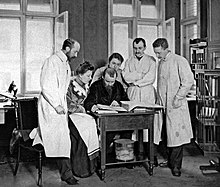Max Lewandowsky

Max Lewandowsky (June 28, 1876 – April 4, 1916) was a German neurologist, who was a native of Berlin, born into a Jewish family.[1]
Personal life
Lewandowsky studied medicine at the Universities of Marburg, Berlin and Halle, earning his medical doctorate at Halle in 1898. In 1902 he obtained his post-graduate qualification for physiology, and in 1904, received training in clinical neurology and psychiatry under Karl Bonhoeffer and Franz Nissl at the University of Heidelberg. Afterwards he travelled to Paris, where he studied under neurologist Pierre Marie.[2] Beginning in 1905 he worked in the Berlin-Friedrichshain hospital.[3] During World War I he became infected with typhus and died.
Academic Contributions
Lewandowsky coined the term "Blood–brain barrier" in 1900, referring to the hypothesized semipermeable membrane which separated the human central nervous system from the rest of the body's vasculature, and which prevented the entry of certain compounds from entering the brain when injected into the bloodstream.[4] Two years earlier, researchers Arthur Biedl and R. Kraus had formed a similar hypothesis when low-concentration "bile salts" failed to affect behavior (and thus, in theory, had failed to enter the brain) when injected into the bloodstream of animals.[5]
Beginning in 1910 he, together with Alois Alzheimer, edited the journal Zeitschrift für die gesamte Neurologie und Psychiatrie. He was also editor of a handbook of neurology, Handbuch der Neurologie (1910–14).[3]

References
- Holdorff, B (2004). "Founding years of clinical neurology in Berlin until 1933". J Hist Neurosci. 13 (3): 223–38. doi:10.1080/09647040490510524. PMID 15370309.
- ^ Louis Gershenfeld, The Jew in Science, Jewish Publication Society of America (1934), p. 103
- ^ Doing Medicine Together: Germany and Russia Between the Wars by Susan Gross Solomon
- ^ a b Deutschsprachige Neurologen und Psychiater: Ein biographisch by Alma Kreuter
- ^ Ribatti, Domenico; Nico, Beatrice; Crivellato, Enrico; Artico, Marco (January 2006). "Development of the blood-brain barrier: A historical point of view". The Anatomical Record Part B: The New Anatomist. 289B (1): 3–8. doi:10.1002/ar.b.20087. ISSN 1552-4906. PMID 16437552.
- ^ Biedl, A; Kraus, R (1898). "Über eine bisher unbekannte toxische Wirkung der Gallensäure auf das Zentralnervensystem". Zentralbl. Inn. Med 19: 1185–1200.
